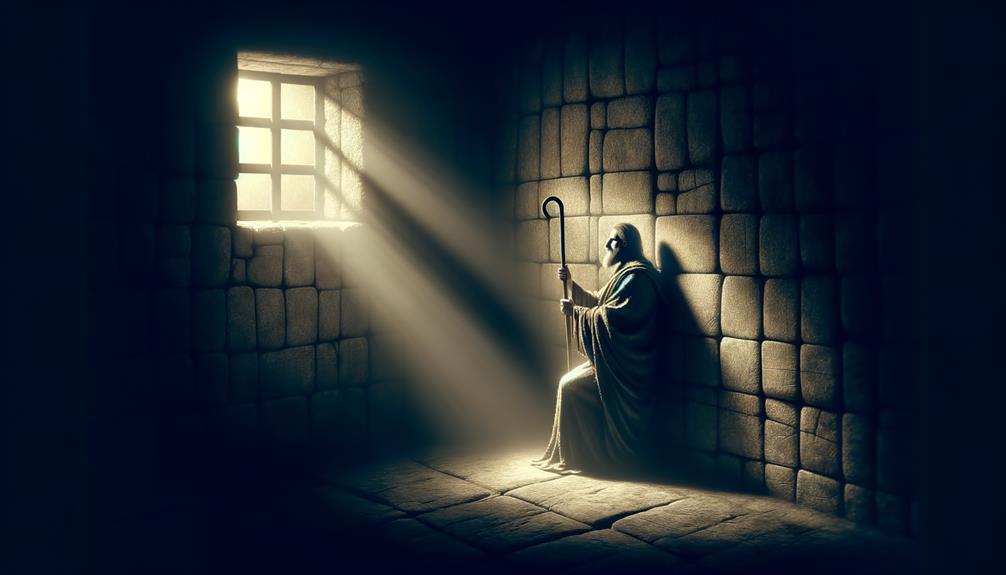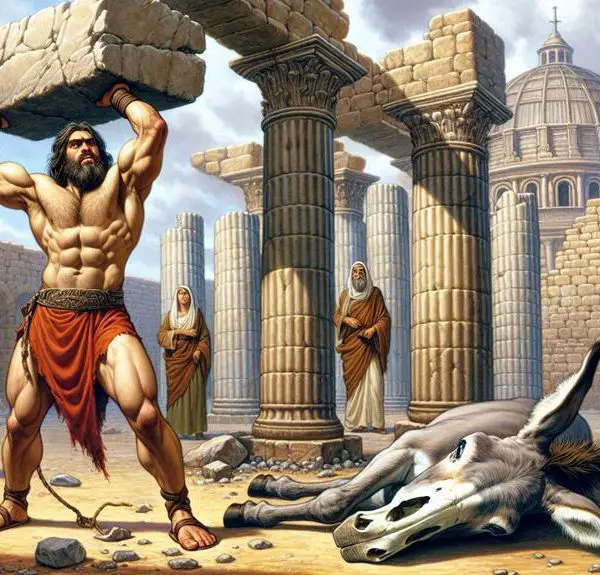Discover John the Baptist's pivotal role in the Bible, from his prophetic birth to a dramatic end, and why his story compels deeper exploration.

Where Is John the Baptist in the Bible
Navigating the tapestry of the Bible to find John the Baptist is akin to tracing a river back to its source. You'll encounter him in the Gospels, where his life unfolds from a miraculous birth foretold by an angel, through his ministry in the wilderness, to the pivotal moment he baptizes Jesus.
His story, marked by prophetic declarations and a tragic end, plays a crucial role in the New Testament. But to truly understand his impact and the depth of his message, you must explore the events leading to his imprisonment and subsequent beheading.
The reasons behind these events shed light on the complexities of his time and teachings, inviting you to look closer.
Key Takeaways
- John the Baptist's birth and prophecy are detailed in the Gospel of Luke, Chapter 1.
- His ministry, including baptizing Jesus, is primarily found in the Gospels of Matthew (3), Mark (1), and Luke (3).
- The account of John's imprisonment and beheading is recounted in Matthew 14 and Mark 6.
- John's role and significance are also mentioned in the Gospel of John, specifically in Chapters 1 and 3, highlighting his testimony about Jesus.
The Birth Foretold

The story of John the Baptist's birth begins with a divine announcement, foretelling his pivotal role in the biblical narrative. Your understanding of this event isn't just a tale of miraculous occurrences but a cornerstone of theological history, intricately woven with details of parental lineage and angelic visitation that set the stage for his life's mission.
John's lineage, deeply rooted in the priestly traditions of the Jews, is crucial to grasp. His father, Zechariah, served as a priest in the temple of Jerusalem, while Elizabeth, his mother, also hailed from Aaron's priestly line. This dual heritage didn't just signify a religious upbringing but positioned John within a framework of spiritual authority and expectation. Their devoutness and adherence to God's commandments underscored the significance of John's forthcoming role, making the circumstances of his conception even more momentous.
The angelic visitation to Zechariah in the temple marks a pivotal moment in this narrative. This wasn't merely an announcement of an impending birth but a divine intervention that underscored the significance of John's mission. The angel Gabriel, a messenger of God, revealed not only that Elizabeth would bear a son but detailed John's destiny as a forerunner to the Messiah. This moment, steeped in divine communication, bridged the human and the heavenly, emphasizing the extraordinary nature of John's purpose.
Analyzing these elements—parental lineage and angelic visitation—provides a detailed understanding of John the Baptist's foretold birth. It's a narrative that intertwines the human with the divine, setting the stage for one of the most influential figures in the biblical story.
The Miraculous Birth
Following the divine announcement, Elizabeth's pregnancy marked not only a fulfillment of prophecy but also an unprecedented event that defied the natural limitations of age and barrenness. Elizabeth's barrenness had been a significant source of personal anguish and societal stigma. However, the angelic visitation to her husband, Zechariah, heralded a miraculous change in their circumstances. This event underscores the power and precision of divine intervention in human affairs, particularly in the fulfillment of biblical prophecies.
The story of John the Baptist's conception and birth is rich with theological and historical implications. Here are three critical aspects to consider:
- Divine Intervention: The angel Gabriel's announcement to Zechariah inside the temple not only promised a child to the elderly couple but also proclaimed the child's pivotal role in salvation history. This underscores the belief in a God who intervenes directly in human history to fulfill divine purposes.
- Elizabeth's Faith: Despite her initial disbelief, Elizabeth's subsequent embrace of her pregnancy demonstrates a profound shift from doubt to faith. Her experience exemplifies the transformative power of embracing God's will, even when it seems impossible.
- Symbolic Significance: John's birth signifies the breaking of Elizabeth's barrenness, symbolizing the breaking of Israel's spiritual barrenness. His arrival heralds a new era of prophecy and divine action, setting the stage for the coming of Jesus.
Analyzing the miraculous birth of John the Baptist, we're reminded of the themes of hope, faith, and divine promise. Elizabeth's story, from her angelic visitation to the birth of her son, encapsulates the miraculous, intertwining the human with the divine in the unfolding of biblical salvation history.
Ministry in the Wilderness

You'll find John the Baptist's ministry in the wilderness marked a pivotal moment in biblical history. His preaching began in the desolate landscapes, where he baptized believers in the Jordan River, emphasizing a powerful message of repentance.
This act not only symbolized purification but also prepared the way for Jesus' imminent ministry, underscoring the transformative power of repentance in spiritual renewal.
Wilderness Preaching Begins
Emerging from his years of solitary preparation, John the Baptist initiated his public ministry in the wilderness, calling for repentance and baptizing those who responded to his message. His lifestyle and teachings, deeply rooted in ascetic practices, were pivotal in setting the stage for the coming Messiah.
Here are three key aspects of John's ministry in the wilderness:
- Desert Diet: Embracing simplicity, his diet primarily consisted of locusts and wild honey, symbolizing his commitment to a life devoid of worldly pleasures.
- Locust Clothing: Garbed in clothes made of camel's hair tied with a leather belt, he stood apart, visually embodying his prophetic role.
- Message of Repentance: His preaching was laser-focused on urging people to repent for the forgiveness of sins, preparing them for the imminent arrival of Jesus.
Baptizing in Jordan River
In the heart of the wilderness, John the Baptist chose the Jordan River as the site for his baptisms, symbolizing purification and preparation for the arrival of the Messiah. This location wasn't arbitrary; Jordan's significance in Jewish history as a boundary and place of transition underscored the transformative nature of John's baptism.
By immersing individuals in these waters, he invoked the river's deep historical and spiritual connotations, emphasizing the act of ritual purification. This baptism wasn't merely a physical cleansing but a profound, symbolic preparation, urging the people to ready their hearts and minds for the new era that the coming Messiah would usher in.
Through this act, John intertwined his ministry's message with the sacred landscape of the Jordan, deepening the ritual's impact and significance.
Message of Repentance
John the Baptist consistently emphasized a message of repentance as he preached in the wilderness, urging his followers to turn away from their sins and prepare for the coming of the Lord. This call to repentance carried a sense of moral urgency, signaling not just personal transformation but also a societal impact.
- Moral Urgency: John's message underscored the immediate need for ethical realignment, stressing that the kingdom of heaven was at hand.
- Personal Transformation: He advocated for a profound personal change, a complete turning away from sin towards a righteous path.
- Societal Impact: The collective repentance was seen as pivotal for societal renewal, emphasizing that a morally upright society was essential for welcoming the Messiah.
Through this, John the Baptist's ministry in the wilderness laid a foundational ethos for the coming Christian teachings.
Baptizing Jesus

You now approach a pivotal moment in biblical narrative: the baptism of Jesus by John the Baptist in the River Jordan.
This act not only signifies the beginning of Jesus' public ministry but also marks a divine endorsement, witnessed by the descending Holy Spirit and the voice from heaven.
Through analyzing the River Jordan encounter, exploring the divine approval, and understanding the symbolism of baptism, you'll grasp the profound implications of this event on Christian theology and practice.
River Jordan Encounter
At the heart of the River Jordan encounter, John the Baptist ceremoniously baptized Jesus, marking a pivotal moment in the Christian narrative. This event isn't just a simple ritual; it's layered with symbolism and meaning that reflect John's unique role and the initiation of Jesus' public ministry.
- Ascetic Lifestyle: John's choice of diet, consisting of desert locusts, and his garment made of camel hair, underscore his ascetic lifestyle, highlighting his dedication and preparation for this moment.
- Ritual of Baptism: The act of baptizing in the River Jordan symbolizes purification and readiness for a new life. Through baptism, John prepares individuals for the coming of the Messiah.
- Transition of Authority: This moment also represents a transitional point where John acknowledges Jesus' superiority, setting the stage for Jesus' ministry.
The Divine Approval
The baptism of Jesus by John the Baptist marks a moment of divine approval, signaling a significant endorsement of Jesus' ministry from the heavens above. This act wasn't just a ritual cleansing but embodied heavenly recognition, pointing to Jesus as the chosen one.
When the skies opened, and a voice declared Jesus as the beloved Son, it wasn't merely an affirmation of Jesus' identity; it underscored a prophetic validation of his mission. This divine endorsement through baptism by John, a respected prophet, lent unparalleled legitimacy to Jesus' teachings and works. It bridged the human and the divine, affirming Jesus' role in fulfilling divine will.
Such an event, steeped in heavenly approval, underscored the significance of Jesus' journey, setting the stage for his transformative ministry.
Symbolism of Baptism
Building on the divine approval marked by Jesus' baptism, it's crucial to explore the rich symbolism embedded within this act of baptizing Jesus. This moment isn't just a historical footnote; it's laden with significance that echoes through the ages.
- Spiritual Rebirth: Baptism symbolizes the death of the old self and the birth of a new, spiritual life. Through this act, Jesus illustrates the transformative power of faith and commitment to God's will.
- Cleansing Ritual: Beyond mere physical cleansing, baptism represents the washing away of sins. For Jesus, it signified purity and sinlessness, setting an example for all believers.
- Divine Endorsement: This event affirmed Jesus' mission and identity, marking Him as God's chosen one, destined to lead humanity towards salvation.
John's Imprisonment

John's imprisonment, a pivotal event in the narrative, reflects the escalating tensions between his ministry and the political powers of his time. You'll find that Herod's motives for imprisoning John are deeply intertwined with both personal vendettas and broader political implications. Herod, feeling threatened by John's growing influence and his bold condemnation of the king's marriage to Herodias, his brother's wife, saw imprisonment as a means to silence a potential disruptor. This action, however, was more than a personal or political maneuver; it was a stark illustration of the dangerous intersection between prophetic truth-telling and political power.
The political implications of John's imprisonment are profound. It serves as a cautionary tale about the cost of speaking truth to power. John's fearless critique of Herod's moral failings put him directly in the crosshairs of a political system that didn't tolerate dissent. This episode in the Bible underscores the volatile nature of John's prophetic ministry and its inevitable collision with the ruling elite.
Furthermore, John's detention highlights the precarious position of religious figures who challenge the societal and political norms of their time. It's a vivid reminder of the risks inherent in confronting entrenched power structures. John's imprisonment wasn't just a personal tragedy; it was a moment that exposed the fragility of moral authority in the face of political might.
In analyzing John's imprisonment, it's clear that this event was a critical juncture, not only in John's life but also in the narrative of biblical history, illustrating the complex dynamics between prophecy, morality, and political authority.
The Beheading of John
In a dramatic climax to his confrontation with political power, John the Baptist's life was tragically cut short through his beheading, an event steeped in Machiavellian intrigue and personal vengeance. This moment isn't just a tale of martyrdom; it's a complex interplay of political intrigue, moral conviction, and the consequences of speaking truth to power.
You see, Herod Antipas, the ruler of Galilee, initially imprisoned John not out of a desire to kill him, but because John had publicly condemned Herod's marriage to Herodias, his brother's former wife. This act of speaking out against the ruler's moral transgressions was bold and dangerous. Yet, it wasn't Herod's decision alone that led to John's execution.
The narrative unfolds further into a web of political intrigue and personal vendettas:
- Herod's Guilt: Despite Herod's initial reluctance to execute John, fearing public backlash and acknowledging John as a righteous man, he was plagued by guilt and political pressure. Herodias, seeking revenge, saw an opportunity to manipulate the situation.
- Herodias' Vengeance: Seizing her moment during Herod's birthday celebration, Herodias persuaded her daughter Salome to request John's head on a platter as a reward for her dance. Herod, trapped by his promises and the expectations of his guests, reluctantly ordered John's execution.
- The Beheading: This act wasn't only a brutal conclusion to John's life but also a stark representation of the dangers faced by those who dare to challenge the status quo.
John's beheading serves as a poignant reminder of the cost of moral courage in the face of political intrigue and personal vendettas.
Frequently Asked Questions
How Did John the Baptist's Lifestyle and Diet in the Wilderness Symbolize His Message to the People?
John the Baptist's lifestyle and diet in the wilderness, featuring locusts and wild honey, embodied a message of purity and preparation. Living in desert solitude, he epitomized a life detached from worldly pleasures, highlighting baptismal symbolism.
His call for repentance and baptism as a cleanse from sins was visually represented by his own austere existence. This simplicity and his direct connection with nature underlined the sincerity and urgency of his call to the people.
Can You Explore the Significance of John the Baptist's Garments and Why He Chose to Wear Camel's Hair With a Leather Belt?
Why would someone choose desert fashion like camel's hair and a leather belt? It's not just about historical accuracy; it's a profound statement.
John the Baptist's garments symbolized a return to simplicity and a call to repentance. This attire harked back to the prophets, emphasizing his role as a forerunner to Christ. His choice was deliberate, highlighting a life stripped of excess, focusing solely on spiritual preparation.
How Did John the Baptist's Teachings Influence the Early Christian Church and Its Doctrines?
John the Baptist's teachings profoundly influenced the early Christian church. Especially through his emphasis on baptism's significance and a repentance message.
You'll find his call to baptism was a foundational ritual for Christians, symbolizing purification and commitment to God. Moreover, his insistence on repentance for the forgiveness of sins shaped the church's doctrine, stressing ethical living and a personal relationship with God.
This laid the groundwork for Christian beliefs and practices.
What Are the Various Interpretations of John the Baptist's Role as the "Elijah" Who Was to Come, as Mentioned in Prophetic Texts?
You're exploring John the Baptist's prophetic identity, particularly his role as the 'Elijah' expected to return. This concept stems from interpretations of Old Testament prophecies, suggesting Elijah's return would herald significant events.
Critics and theologians debate whether John truly embodied this role or symbolically represented Elijah's spirit. His ascetic lifestyle and powerful preaching mirror Elijah's, reinforcing his importance in fulfilling prophecies and preparing the way for Jesus' ministry.
Are There Any Accounts of John the Baptist Performing Miracles Similar to Those of Jesus, and What Is Their Significance in the Broader Biblical Context?
Diving into the heart of miracle debates, you'll find no accounts of John the Baptist performing miracles akin to those of Jesus. This absence isn't a mere oversight but a profound statement on his role and message.
Historical verification leans towards emphasizing his baptizing and prophetic activities rather than supernatural acts. This distinction further elevates Jesus' unique position, underscoring John's purpose to prepare the way, not overshadow the Messiah's coming.
Conclusion
You've ventured through John the Baptist's life, from his miraculous birth to his tragic ending. Some may argue that focusing on such details is morbid or irrelevant. Yet, understanding his journey is crucial. It reflects the profound impact John had on religious history and Jesus' ministry.
His life wasn't just a series of events; it was a pivotal part of a larger narrative that shaped Christianity. By acknowledging this, you're not just learning history; you're uncovering the layers of a foundational story.



Sign up